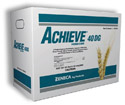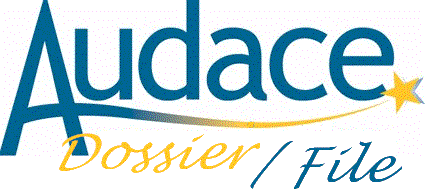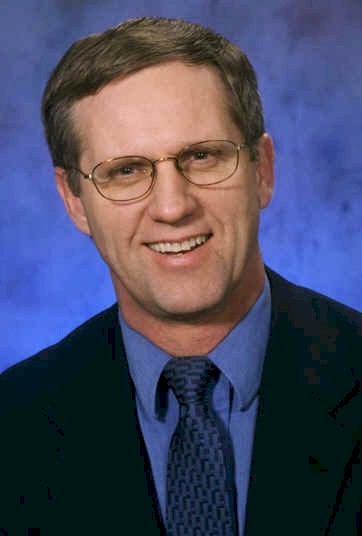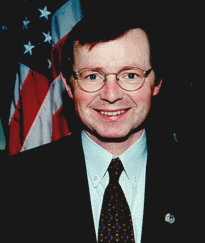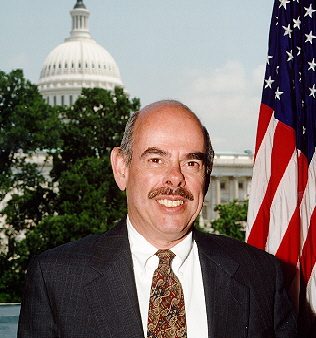|
© Zeneca Ag Products |
Achieve © 40 v 80 DG a case of market segmentation by Zeneca in America
|
"Achieve® 80DG, a herbicide that controls grassy weeds in wheat and barley, is a lower-cost version of Achieve® 40 DG. Zeneca has obtained EPA registrations for both formulations, but has chosen to sell only the higher-priced Achieve® 40DG in the U.S." | |
| Les
événements en ordre chronologique
PRODUCT USA Canada
IMPORTING Procedure for importing Achieve 80© DG into North Dakota Customs regulations 19 CFR parallel import
EPA says no to imports to R Johnson 5July2000
Johnson refutes pesticide makers' claims 7June2000
Loi d'Harmonisation
As first introduced by Mr Pomeroy 24 May 1999 before 106th Congress
COMMITTEE ON AGRICULTURE
Testimony Novartis Seed Jack Bernens.htm
Statement
of
Leonard Gianessi Senior Research
Associate, National Center for Food and Agricultural Policy
John
Wichtrich, Vice President and General Manager for Aventis CropScience
Nathan
Boardman, president of the American Seed Trade Association
Jay
Vroom, President of the American Crop Protection Association (ACPA)
Statement
of Robert E. Robertson
COMMITTEE ON AGRICULTURE
|
IL N’EST DE BONNE HISTOIRE QUI NE SE REPETE
Un produit se présente sous deux formulations différentes dans deux pays.
Les différences ne concernent que la concentration en substance active et résultent donc de la seule volonté marketing du fabricant.
Ramené à la même concentration, le produit est beaucoup plus cher dans l’un des deux pays que dans l’autre.
Audacieusement, les distributeurs et agriculteurs du premier décident d’importer le produit du second… Cette histoire a sans doute un air de « déjà entendu » et de tragi-comédie déjà jouée par AUDACE sur la scène du marché communautaire.
Mais lorsque les pays en question sont, cette fois, les USA et le Canada ; lorsque les intervenants à l’importation sont soutenus voire incités par les pouvoirs politique et judiciaire ; lorsque ce soutien et cette incitation sont portés jusqu’à la plus haute assemblée parlementaire pour que soit immédiatement statué de leur légitimité ; … et lorsque le fabricant n’est autre, une fois de plus, que la firme ZENECA ;
ZENECA vend au Canada le produit Achieve 80DG et aux USA le même produit sous-titré de 50% sous le nom Achieve 40DG.
Ramené à la même concentration, le produit américain est beaucoup plus cher que le produit canadien.
ZENECA entend s’opposer aux importations de ce dernier, sous prétexte de sa plus grande toxicité, et saisit les autorités compétentes américaines chargées des A.M.M. (EPA), lesquelles donnent raison à la firme.
Jusque là, le scénario US est un remake du scénario français.
Mais au pays où le marché est roi et les firmes sont reines, il ne saurait être question de laisser l’affaire en cet état.
C’est ainsi que deux hauts fonctionnaires du Dakota du Nord, dont l’un occupe le poste équivalent à celui d’un ministre français de l’agriculture, déclarent que ZENECA est plus soucieuse de la défense de ses intérêts que de la sécurité ou de la performance de ses produits, et que s’il y avait un facteur de toxicité s’opposant à l’utilisation de l’Achieve 80DG aux USA, il conviendrait d’arrêter l’importation du blé canadien.
Et ces deux autorités de rallier les onze Etats frontaliers du Canada, d’élaborer une réglementation adaptée aux importations parallèles et de la soumettre à l’approbation du Congrès.
Du 26 mai au 14 septembre 2000, le « phyto » est au coeur de la Haute Assemblée américaine, devant laquelle défilent les Présidents des firmes, dont ZENECA et MONSANTO, pour tenter d’empêcher que le texte libérateur de leurs diktats commerciaux ne soit adopté.
En liaison directe avec le Commissaire à l’agriculture du Dakota du Nord, Monsieur Roger Johnson et l’Avocat Général Heidi Heitkamp, AUDACE suit le déroulement de cette affaire dont le dénouement ne laisse guère de doute en faveur des importations.
Pour l’heure, il est déjà acquis qu’aux USA, les aberrations marketing des firmes contre les intérêts des agriculteurs passent bien moins inaperçues qu’en Europe.
Déclaration de Roger Johnson Commissaire de l’Agriculture du Nord Dakota, lors de l’introduction de l’Acte d’Harmonisation des Pesticides par le Congressiste des U.S.A Earl Pomeroy le 15 septembre 2000
L’introduction de l’Acte d’Harmonisation des Pesticides va permettre à des distributeurs de produits agrochimiques, des Etats et bien d’autres, d’agir en toute légalité en important certains pesticides du Canada. Si elle passe par le Congrès, cette législation permettra de sauver des millions de dollars par an pour les agriculteurs du Nord Dakota. Le Projet de Loi d’Harmonisation des Pesticides est le résultat d’un effort de collaboration entre le bureau du Congressiste Pomeroy, le Département de l’Agriculture du Nord Dakota, l’Agence de Protection de l’Environnement (EPA), et d’autres organisations agricoles. Notre but a été de développer un statut législatif aux détails techniques de l’Acte Fédéral des Insecticides, Fongicides et Rodenticides (FIFRA) qui, tel qu’interprété actuellement par l’EPA, ne permet pas l’importation de certains pesticides canadiens aux Etats-Unis.
La législation du Congressiste Pomeroy autoriserait des entités américaines à importer certains pesticides du Canada, à la condition que le produit soit légalement utilisé au Canada et soit identique ou substantiellement semblable à un pesticide légalement utilisé aux Etats-Unis. Cette législation éliminerait effectivement la capacité pour les sociétés chimiques de contourner le problème des pratiques de prix disparates (segmentation de marché) et de les forcer à la compétition dans un marché libre et ouvert, exactement comme le font les agriculteurs des Etats-Unis et du Canada. Fin mai, avec le conseil du Procureur Général Heidi Heitkamp, j’ai publié l’étiquette d’EPA pour Achieveâ 80DG sur le site du Département de l’Agriculture du Nord Dakota, permettant aux agriculteurs et marchands du Nord Dakota d’acheter le pesticide au Canada. Le producteur Zeneca Ag products, a dès lors déposé une plainte devant l’EPA contestant cette action. EPA m’a écrit au début juillet déclarant que, à son avis, FIFRA ne permet pas l’importation de l’herbicide Achieveâ 80DG du Canada vers le Nord Dakota. Le résultat de mon travail sur tous les fronts, administratif, législatif et judiciaire, fut le suivant. Le 11 août 2000, le Procureur Général Heitkamp et moi avons entamé une action judiciaire contre l’EPA, défiant son interprétation du FIFRA. Notre position est celle-ci : l’interprétation de l’EPA du FIFRA n’est pas cohérente par rapport aux lois fédérales et l’EPA a mal appliqué le FIFRA en refusant d’accorder aux agriculteurs du Nord Dakota le droit d’importer l’herbicide Achieveâ 80DG . L’application d’EPA est injuste pour les agriculteurs du Nord Dakota, car elle permet à Zeneca de traiter différemment nos agriculteurs au niveau du prix, et EPA les traite injustement d’un point de vue réglementaire. Achieveâ 80DG, un herbicide qui contrôle les herbes grasses de froment et d’escourgeon, est une version moins chère d’ Achieveâ 80DG. Zeneca a enregistré les 2 formulations avec EPA, mais a choisi de vendre seulement la version plus onéreuse, Achieveâ 40DG, aux E.U. Cette poursuite judiciaire concerne spécifiquement cet herbicide; cependant, elle servira de précédent si une situation semblable se présente dans le futur. Aujourd’hui, nous avons avancé plus loin en essayant de résoudre ce problème et de créer un environnement équitable pour les agriculteurs du Nord Dakota.
Suivi des Evénements pour Achieveâ 80DG
Octobre 1999 USDA (United States Department of Agriculture) délivre un rapport sur "Les Différences de Prix des Pesticides entre le Canada et les Etats-Unis".
16 octobre 1999 Le Département de l’Agriculture du Nord Dakota (NDDA) écrit à Zeneca Agro, la filiale Canadienne, demandant l’approbation d’un Enregistrement Spécial des Besoins Locaux (24c) pour Achieveâ 80DG.
26 octobre 1999 Zeneca répond par lettre, disant que Achieveâ 80DG sera interrompu mondialement au-delà des 2 années prochaines et sera uniquement disponible "dans les chaînes de distribution" jusqu’à ce que le stock s’épuise. Zeneca déclare qu’il ne produira pas un label E.U. pour cette raison.
25 mai 2000 NDDA est informé qu’un producteur ND a importé Achieveâ 80DG du Canada et l’a déclaré aux Douanes des E.U. Les Douanes ont autorisé le passage du produit au Nord Dakota.
26 mai 2000 Le Commissaire Johnson écrit une lettre à l’EPA, Région 8, concernant une éventuelle action de contrainte légale pour le producteur qui a importé Achieveâ 80DG aux E.U. NDDA eut une conversation téléphonique avec un employé de Zeneca et fut informé qu’Achieveâ 80DG était déjà enregistré aux E.U. mais non commercialisé.
30 mai 2000 EPA confirme qu’Achieveâ 80DG était enregistré aux E.U.
31 mai 2000 Le commissaire Johnson tient une conférence de presse annonçant son intention de publier l’étiquette, avec le numéro d’enregistrement, pour Achieveâ 80DG sur le site de NDDA, afin de permettre l’importation dans le ND). L’étiquette, de même que les instructions pour importer l’herbicide, est publiée le même jour. EPA est instruit de l’action.
1 juin 2000 NDDA apprend le premier chargement d’Achieveâ 80DG traversant la frontière vers les E.U., sous le formulaire d’importation 3540-1, "Notice d’Arrivée de Pesticides et Devises". NDDA n’était pas conscient de cette procédure. Zeneca contacte le Commissaire Johnson, demandant une rencontre pour discuter de son action.
2 juin 2000 Les représentants de Zeneca arrivent à Bismarck pour rencontrer le Commissaire Johnson, le Procureur Général Heitkamp et les membres du personnel, et expriment leur souci de régler la situation. Johnson demande à la firme d’approuver publiquement l’action du Nord Dakota, ce qu’elle refuse. Zeneca argumente par 3 raisons pour lesquelles le produit est moins cher au Canada : 1° le taux de change; 2° les agriculteurs canadiens font moins de profit; 3° problèmes de concrétion. Durant la même réunion, Zeneca confirme que l’utilisation de Achieveâ 80DG n’implique pas de danger pour la santé humaine ou l’environnement, et que les problèmes de concrétion avec Achieveâ 80DG ont été résolus au milieu des années 90. Zeneca promet une réponse écrite et formelle à l’action du Nord Dakota.
5 juin 2000 Au lieu de fournir cette réponse formelle, Zeneca écrit à EPA, lui demandant d’entreprendre une action contre le Nord Dakota pour violation du FIFRA, et lui demande également une réunion pour discuter du sujet.
8 juin 2000 Ayant appris la démarche de Zeneca, le Commissaire demande de participer à cette réunion. NDDA est informé que la Région 8 de l’EPA a approuvé deux formulaires 3540-1.
9 juin 2000 Zeneca rencontre EPA à Washington DC pour discuter de la situation. Le Commissaire Johnson et le Procureur Général Heitkamp participent par téléphone à la réunion. Heitkamp promet d’élaborer une réponse écrite et formelle à EPA pour adresser la plainte de Zeneca. EPA notifie NDDA qu’une décision sera prochainement prise, au plus tôt la semaine suivant la réception d’EPA de cette réponse écrite du Nord Dakota. Le même jour, la Région 8 d’EPA arrête la délivrance du formulaire 3540-1, se basant sur une directive de l’EPA à Washington.
12 juin 2000 Le Commissaire Johnson et le Procureur Général Heitkamp écrivent à l’EPA pour réfuter les arguments de Zeneca soulevés dans la lettre du 5 juin.
29 juin 2000 Les officiels de l’agriculture des 12 Etats frontaliers avec le Canada rejoignent Johnson dans une lettre demandant à l’administrateur de l’EPA, Carol Browner, d’aider les agriculteurs des E.U. à obtenir les pesticides au même prix que les agriculteurs canadiens. Le même jour, le Comité d’Agriculture Intérieure (House Agriculture Committee) tiennent une audition sur les conséquences financières agricoles. Parmi ceux qui témoignent se trouve le président de Zeneca Ag Products Inc., Robert Woods.
5 juillet 2000 EPA envoie une lettre à NDDA répondant à leur action avec Achieveâ 80DG, et affirme que placer une étiquette sur un pesticide est considéré comme "produire" et que les étiqueteurs auraient besoin d’une homologation d’EPA.
7 juillet 2000 Le sénateur des E.U. Byron Dorgan bloque l’approbation de 2 candidats EPA jusqu’à ce que l’affaire soit résolue.
12 juillet 2000 NDDA envoie une lettre formelle à EPA et propose des arguments pour une législation fédérale apte à faciliter l’importation et l’utilisation de pesticides canadiens.
13 juillet 2000 Le Commissaire Johnson envoie une lettre à EPA demandant leur position légale sur l’apposition d’une étiquette en considérant les exemptions d’urgence et les enregistrements de besoins locaux spécifiques (SLN). EPA envoie à NDDA l’esquisse retravaillée de la législation. Le texte établit que le Nord Dakota doit être inscrit sur une liste comme détenteur de l’homologation. Durant les conversations téléphoniques suivant la réception de la lettre EPA, NDDA déclare que cette exigence est inacceptable.
25 juillet 2000 Le Commissaire Johnson, l’assistant du Procureur Général Paul Germolus et le spécialiste des homologations (AMM) de la NDDA Jim Gray rencontrent les avocats d’EPA, le personnel et la délégation du Congrès pour travailler à la finalisation de l’esquisse législative.
26 juillet 2000 L’Association des Départements d’Agriculture des Etats du Midwestern adopte une résolution rédigée par le Commissaire Johnson pour soutenir l’harmonisation des prix des produits chimiques.
28 juillet 2000 Les membres de l’Accord Tri-National soutiennent les efforts d’harmonisation en joignant leur parole dans leur "Communiqué Commun". L’Accord est une réunion annuelle des homologues agricoles du Commissaire Johnson aux E.U., au Canada et au Mexique.
2 août 2000 NDDA et EPA s’accordent sur l’esquisse de législation fédérale.
11 août 2000 Le Procureur Général Heitkamp et le Commissaire Johnson entame une procédure judiciaire contre EPA concernant leur interprétation de l’Acte Fédéral des Insecticides, Fongicides et Rodenticides (FIFRA). NDDA rencontre les représentants de groupes de détaillants, d’distributeurs de produits agrochimiques et de distributeurs pour recevoir leur contribution à la législation esquissée. L’apport des participants de la réunion est alors utilisée pour réviser la législation esquissée.
8 septembre 2000 Ce projet de législation est envoyé au bureau du Congressiste Pomeroy. 14 septembre 2000 Le Congressiste Earl Pomeroy introduit l’Acte d’Harmonisation des Pesticides.
|
THIS ONE'S GOT LEGS...
A product is present in two different formulations in two countries.
The differences relate only to the concentration of active substance, therefore solely due to the marketing will of the manufacturer.
Brought back to the same concentration, the product is much more expensive in one of the two countries than in the other.
AUDACiously, distributors and farmers in the first country decide to import the product from the second…This story undoubtedly has an air of « we've seen it all before » and of the tragicomedy already played by AUDACE on the stage of the European Community's market.
But when the countries in question are, this time, the USA and Canada; when the protagonists who perform the importation are supported even encouraged by government authorities and the judiciary; when this support and this incentive are taken to the highest level, i.e. the Congress, to rule immediately upontheir legitimacy; … and when the manufacturer is once more, the company ZENECA;
ZENECA sells in Canada the product Achieve 80DG and in the USA the same product in a formulation half the strength under the name Achieve 40DG.
Brought back to the same concentration, the American product is much more expensive than the Canadian product.
ZENECA intends to oppose imports of the latter, and pleads a greater toxicity in order to achieve its ends. The firm referred to the American competentauthorities in charge of the registration process (EPA), who agreed.
Up to this point, the US scenario is a remake of European scenarios.
However, in that country where the market is king and firms are queens, it is quite out of the question to leave this matter as it is.
Two high-ranking civil servants of North Dakota, one of whom is equivalent to a French Agricultural Minister, declared in these terms: "ZENECA's threat to stop sale of one of its products in North Dakota reflects the company's concerns over price, not safety or performance", and: "If there is a safety factor, then the U.S. had best stop importation of any Canadian grain treated with Achieve 80DG."; and called for these two authorities to rally the eleven border States with Canada, to work out a regulation adapted to parallel imports and to submit it to the approval of the American Congress.
From May 26 to September 14 2000, « Pesticides » were the topic of the day every day in the heart of Congress, in the Agriculture House Committee, before which Companies' Presidents appear amongst which ZENECA and MONSANTO try to win support and prevent the adoption of a text that would liberate "the Harmonisation Act" from their commercial diktat.
In direct contact with North Dakota Commissioner of Agriculture Roger Johnson and Attorney General Heidi Heitkamp, AUDACE is following the course of events, the outcome of which will no doubt be in favour of parallel imports.
As for now , it can already be taken as read, that in the US, transnational firms' marketing aberrations that work against the interest of farmers go much less unnoticed than in Europe !
Statement of Roger Johnson North Dakota Agriculture Commissioner on the introduction of the "Pesticide Harmonization Act" by U.S. Congressman Earl Pomeroy September 15, 2000
I am honored to join Congressman Pomeroy today in announcing the introduction of the "Pesticide Harmonization Act," which will allow chemical dealers, states, and others to act as registrants to import certain pesticides from Canada. If passed by Congress, this bill would save North Dakota farmers millions of dollars annually. The "Pesticide Harmonization Act" is the result of a collaborative effort between Congressman Pomeroy’s office, the North Dakota Department of Agriculture, the Environmental Protection Agency, and other agricultural organizations. Our goal has been to develop a legislative fix to the technicalities in the Federal Insecticide, Fungicide, and Rodenticide Act (FIFRA), which, as currently interpreted by EPA, does not allow the importation of certain Canadian pesticides into the United States. Congressman Pomeroy’s legislation would allow U.S. entities to act as registrants to import certain pesticides from Canada. In order for a Canadian product to be imported into the United States, the product must be registered for use in Canada and be identical or substantially similar to a comparable pesticide registered for use in the U.S. This legislation would effectively eliminate the ability of chemical companies to sidestep the issue of disparate pricing practices and force them to compete in a free and open market, just as U.S. and Canadian farmers do. In late May, with the advice oCf Attorney General Heidi Heitkamp, I published EPA’s label for Achieve® 80DG on the North Dakota Department of Agriculture website, enabling North Dakota farmers and dealers to buy the pesticide in Canada. The manufacturer, Zeneca Ag Products, then filed a complaint with the EPA protesting the action. EPA wrote to me in early July stating that, in its opinion, FIFRA does not allow the importation of Achieve® 80DG herbicide from Canada into the state of North Dakota. Following that decision, I pledged to continue to work on all fronts - administrative, legislative, and judicial - to eliminate technicalities in our federal laws that allow chemical companies to engage in disparate pricing practices on both sides of the U.S/Canada border. On August 11, 2000, Attorney General Heitkamp and I filed a lawsuit against the U.S. Environmental Protection Agency (EPA) challenging EPA’s interpretation of FIFRA. Our position is that EPA’s interpretation of FIFRA in not consistent with federal law and that EPA misapped FIFRA when it refused to allow North Dakota farmers and dealers to bring Achieve® 80DG herbicide from Canada into North Dakota. The lawsuit specifically addresses the situation with Achieve® 80DG; however, it will also serve to set a precedent should a similar situation arise in the future. Today, I am pleased to say that we’ve taken another step forward in trying to solve this problem and create a fair environment for North Dakota farmers and ranchers.
Timeline of Events for Achieve® 80DG
October 1999 USDA releases report on "Pesticide Price Differentials Between Canada and the United States."
October 16, 1999 North Dakota Department of Agriculture (NDDA) writes Zeneca Agro, the Canadian subsidiary, requesting approval for a Special Local Needs Registration (24c) for Achieve® 80DG.
October 26, 1999 Zeneca responds in a letter, saying Achieve® 80DG will be discontinued worldwide over the next two years and will only be available "in the distribution channels" until the stock runs out. Zeneca says it will not produce a U.S. label for this reason.
May 25, 2000 NDDA is informed that a ND producer has brought Achieve® 80DG down from Canada and declared it at U.S. Customs. Customs allowed the product to pass through the border into North Dakota.
May 26, 2000 Commissioner Johnson writes a letter to EPA Region 8 regarding potential enforcement action regarding the producer who brought Achieve® 80DG into the US. NDDA had a phone conversation with a Zeneca employee and was informed that Achieve® 80DG was already registered in the U.S., but not marketed here.
May 30, 2000 EPA confirmed that Achieve® 80DG was registered in the U.S.
May 31, 2000 Commissioner Johnson holds a press conference announcing his plan to post the label, with the registration number, for Achieve® 80DG on the NDDA website. The label, along with instructions for importing the herbicide, is posted the same day. EPA was notified of the action taken.
June 1, 2000 NDDA learns of the first load of Achieve® 80DG crossing the border into the United States, minus the import form 3540-1, "Notice of Arrival of Pesticide and Devises". NDDA was unaware of this form. Zeneca contacted Commissioner Johnson asking for a meeting to discuss his action.
June 2, 2000 Zeneca representatives fly to Bismarck to meet with the Commissioner Johnson, Attorney General Heitkamp, and staff members and express an interest in resolving the situation. Johnson asks the company toÅ publicly approve North Dakota’s action, and they refuse. Zeneca argued three reasons why the product was less expensive in Canada: (1) exchange rate (2) Canadian farmers aren’t making much money (3) coagulation problems. During the same meeting, Zeneca confirms that there is no danger to human health or the environment with the use Achieve® 80DG and that the coagulation problems with Achieve® 80DG were resolved in the mid 90’s. Zeneca also promises a formal written response to North Dakota’s action.
June 5, 2000 Instead of providing North Dakota with a formal written response, Zeneca writes EPA asking it to take action against North Dakota for FIFRA violations and also asks for a meeting to discuss the matter.
June 8, 2000 After learning of Zeneca’s letter and request for a meeting, Commissioner Johnson asks to participate in the meeting. NDDA was notified that EPA Region 8 had approved two 3540-1 forms.
June 9, 00 Zeneca meets with EPA in Washington, DC to discuss the situation. Commissioner Johnson and Attorney General Heitkamp join the meeting via phone. Heitkamp promises to issue a formal written response to EPA to address Zeneca’s complaint. EPA notifies NDDA that a decision will be forthcoming by early the following week after EPA receives North Dakota’s written response. That same day, EPA Region 8 stops issuing the form 3540-1, based on a directive from EPA in Washington.
June 12, 2000 Commissioner Johnson and Attorney General Heidi Heitkamp write EPA to refute Zeneca’s arguments raised in the June 5 letter.
June 29, 2000 Top agriculture officials from the 12 border states join Johnson in a letter asking EPA Administrator Carol Browner to help U.S. farmers obtain pesticides at the same prices as Canadian farmers. On the same day, the House Agriculture Committee holds a hearing on agricultural input issues. Among those testifying is Zeneca Ag Products Inc. president, Robert Woods.
July 5, 2000 EPA sends a letter to NDDA responding to their action with Achieve® 80DG and stated that placing a label on a pesticide is considered "producing" and that labelers would need an EPA "Establishment Number."
July 7, 2000 US Senator Byron Dorgan blocks approval of two EPA nominees until the matter is resolved.
July 12, 2000 NDDA sends a letter to EPA with recommended language and reasoning for proposed federal legislation to facilitate Canadian pesticide importation and use.
July 13, 2000 Commissioner Johnson sends a letter to EPA requesting their legal position on affixing labels in regard to emergency exemptions and special local needs (SLN) registrations. EPA sends NDDA reworked draft legislation. The language states that North Dakota needs to be listed as the registrant. During phone conversations following receipt of the EPA letter, NDDA states that this requirement was unacceptable.
July 25, 2000 Commissioner Johnson, Assistant Attorney General Paul Germolus, and NDDA Registration Specialist Jim Gray meet with EPA attorneys and staff and the Congressional delegation to work on finalizing draft legislation.
July 26, 2000 The Midwestern Association of State Departments of Agriculture adopted a resolution authored by Commissioner Johnson in support of chemical price harmonization.
July 28, 2000 Tri-National Accord members support harmonization efforts by including language in their "Joint Communique." The Accord is an annual meeting of Commissioner Johnson’s agricultural counterparts in the U.S., Canada, and Mexico.
August 2, 2000 NDDA and EPA reach agreement on draft federal legislation.
August 11, 2000 Attorney General Heitkamp and Commissioner Johnson file a lawsuit against EPA regarding their interpretation of the Federal Insecticide, Fungicide, and Rodenticide Act (FIFRA).
August 11, 2000 NDDA meets with representatives of commodity groups, chemical dealers, and distributors to seek input on the draft legislation. Input from the meeting participants is then used to revise the draft legislation.
September 8, 2000 Draft legislation is forwarded to Congressman Pomeroy’s office.
September 14, 2000 Congress Earl Pomeroy introduces the "Pesticide Harmonization Act." |
ROGER JOHNSON COMMISSIONER OF AGRICULTURE
600 E Boulevard Ave Dpt 602 BISMARCK North Dakota 58505-0020
"People need to understand that we can talk about harmonization all we want, but until someone aggressively pursues the issue of price harmonization by making it legal for approved products – both Canadian and U.S. - to cross the border, the issue will never be solved," Johnson told the committee
Hon. M K Heidi Heitkamp
Attorney General
Zeneca vend seulement le produit Achieve 40DG plus coûteux aux États-Unis, alors qu'il a fait homologuer les deux formulations. Les deux Achieve 40DG et Achieve 80DG sont disponibles pour la vente au Canada. Le produit Achieve Canadien 80DG revient approximativement à $6 de moins par acre (soit environ US$ 15 par ha) " Zeneca et d'autres fabricants de pesticide exploitent une lacune dans les lois régissant les pesticides aux États-Unis qui leur permet de percevoir un prix plus élevé des agriculteurs américains pour les mêmes produits phytosanitaires qu'ils vendent à nos concurrents, " dit Heitkamp, " dans ce cas précis, il y avait une lacune dans leur omission. "
Witnesses' opening statements submitted in electronic form to the House Committee on Agriculture
Thursday,
June 29, 2000
Extracts
Mr. POMEROY. Part of the NAFTA
promise was that there was to be harmonization about pesticide registration.
Sharp differential in input costs leave United States farmers at a
significant disadvantage, nowhere more so than North Dakota for the reasons
that two of the panelists have mentioned.
Mr. POMEROY. What about older
products? I have an example, for example, where Zeneca sold Achieve in North
Dakota and Canada. They dual registered the product, registered on the north
side, registered on the south side. Pricing differential of about 30
percent. Reasons offered by the company to the North Dakota Department of
Agriculture for the pricing differential included primarily two, neither of
them having to do with registration costs or market size. .
et plus généralement : More Generaly ...
Senator Byron Dorgan's Senate speech on parallel importing legislation
the myths of drug prices US Congress task force
drug companies profit at the expense of older americans
Federal taxation of the drug industry 1990 t 1996
Prescription Drug Task Force Links
Representative
|
